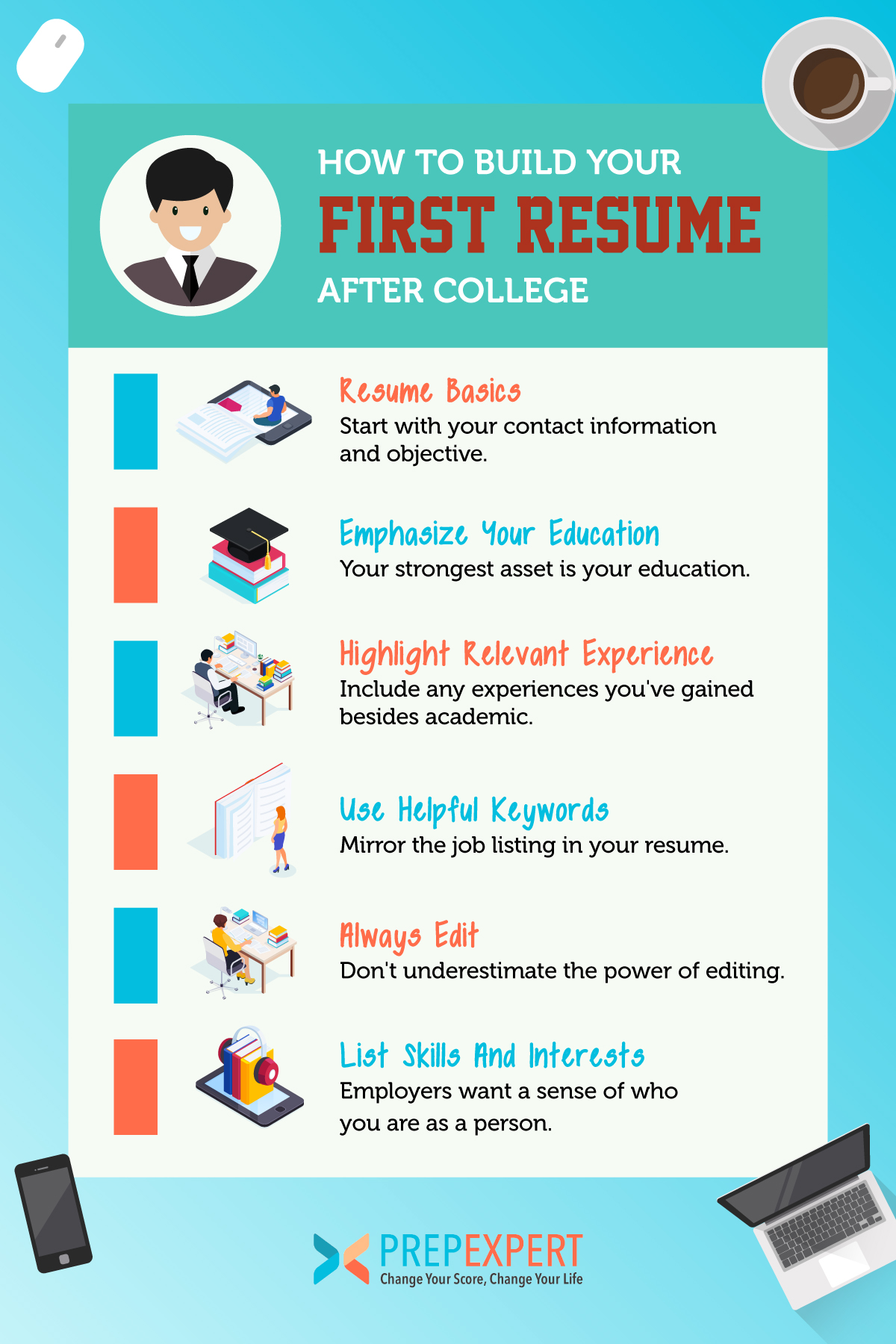How To Build Your First Resume After College
As soon as you graduate from college, the pressure is on to start your post-studies career. However, if you don’t have any significant work experience to present, it can be stressful to make that first resume after college strong enough for employers to seriously consider.
These are the basics on how to put together your first resume after college graduation.
Don’t sweat the SAT or ACT. Take a minute to learn how we can help you with our year-round SAT prep and ACT prep courses today before they have to take either test.
Resume Basics
Start with your contact information and objective.
The first thing to include is your contact information. You should include the following:
- Name
- Phone Number
- Email Address
Don’t worry about including a home address. If you already have an established Linkedin profile, consider including that too but it’s not necessary. Give recruiters the basic information they’ll need to get ahold of you if interested.
Anything more than that is unnecessary. Your objective simply states who you are as a new professional (statement of your college degree will help) and the kind of position you are looking to obtain now.
Emphasize Your Education
Your strongest asset is your education.
Include an ‘Education’ section at the top of your resume, beneath contact information and objective. Include information like:
- Graduating College
- Graduation Date
- Major
- Degree
- GPA (if exceptional)
You can also include any study abroad experiences too, so employers can see you’ve gained that kind of experience. It could help if it’s a position that requires travel.
Highlight Relevant Experience
Include any experiences you’ve gained besides academic.
Helpful examples include:
- Previous work experience
- Volunteer experience
- Internships
- School organizational leadership roles
The point is an employer can see that besides going to class, you’ve invested time in outside extracurriculars and jobs that provided you helpful life experience. A potential employer will like seeing that you’ve spent time in the real world, as well as the classroom.
Use Helpful Keywords
Mirror the job listing in your resume.
If the particular job listing you’re applying to has repeating keywords in it, then try to incorporate them into your resume. For example, if they want someone with strong Excel skills, then include a Skills section and list “Microsoft Office Suite (Excel, Word, etc.).
You can include these keywords in:
- Your resume summary
- Relevant section headings
- Experience descriptions
Understand that the more an employer sees these words in your resume, the better chance they’ll take that extra second to review your document.
Always Edit
Don’t underestimate the power of editing.
Constantly proofread each version of your resume. Correct every spelling and grammar error. Even minor mistakes can cost you if the employer is paying close attention. Also, make sure to use a consistent format.
For example, if you’re using bullet points, make sure they are all the same color and indentation. If the spacing or bullet types fluctuate, an employer will interpret this as sloppiness.
To make things easier, after each version is edited, have a family member or career counselor look it over. They can quickly assess any major problems that need correction with fresh eyes.
List Skills And Interests
Employers want a sense of who you are as a person.
First, include any hard skills you’ve acquired during high school or college:
- Coding skills
- Software tool skills (Photoshop, Google or Microsoft Office, Marketing tools)
- Lab skills
Don’t put down anything vague like “leadership” or “communication”. Employers will already assume you have these kinds of soft skills as a given.
Emphasize anything relevant to the position itself. If you’re applying for an online marketing job, for example, listing ‘SEO’ and ‘social media tools’ won’t hurt.
Besides skills, also list your personal interests. If you like sports and the arts, don’t be afraid to put them down. Give an employer an idea of what you like doing in your spare time because it can provide insight into your personality.
For more test strategy, college admissions, and scholarship application tips sign up for our FREE class happening right now!
Written by Dr. Shaan Patel MD MBA
Prep Expert Founder & CEO
Shark Tank Winner, Perfect SAT Scorer, Dermatologist, & #1 Bestselling AuthorMore from Dr. Shaan Patel MD MBA

How to Get Into Stanford: Breaking Down Stanford Admission Requirements in 2024
Applying to college is overwhelming no matter what schools are on your list, but you might find yourself sweating a…

Why DEI is Destroying Meritocracy and How MEI Can Save Us
In recent years, Diversity, Equity, and Inclusion (DEI) initiatives have become a cornerstone of many corporate and educational policies. While…

Should I Take an SAT Prep Course?
If you’re getting ready to take the SAT soon, you might be wondering whether or not you should enroll in…
